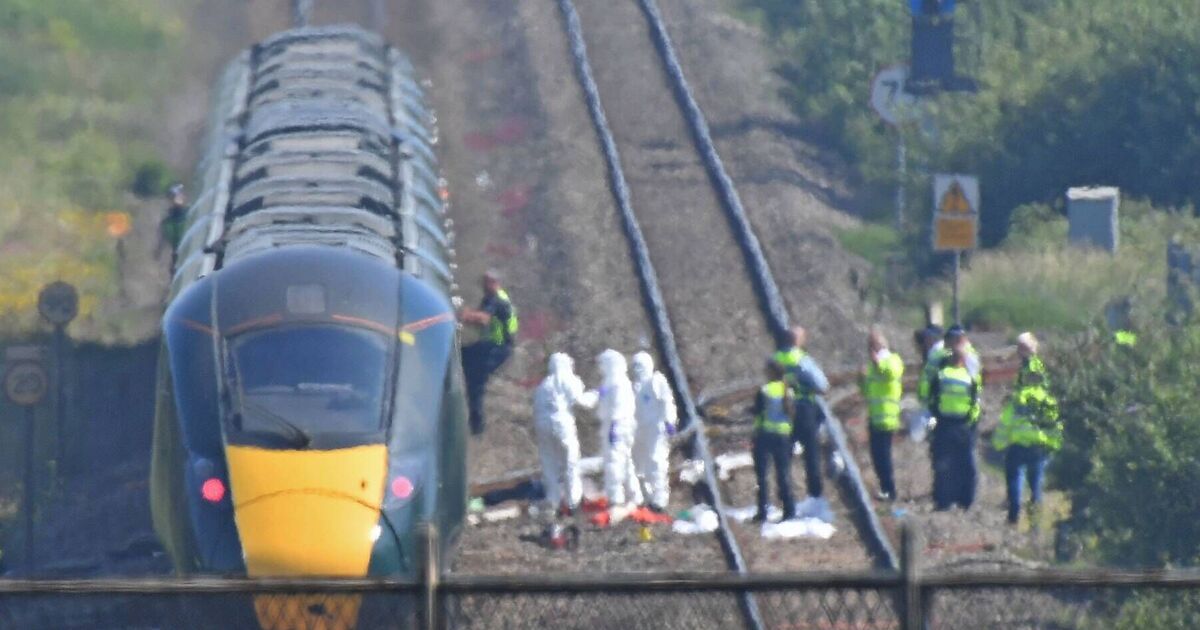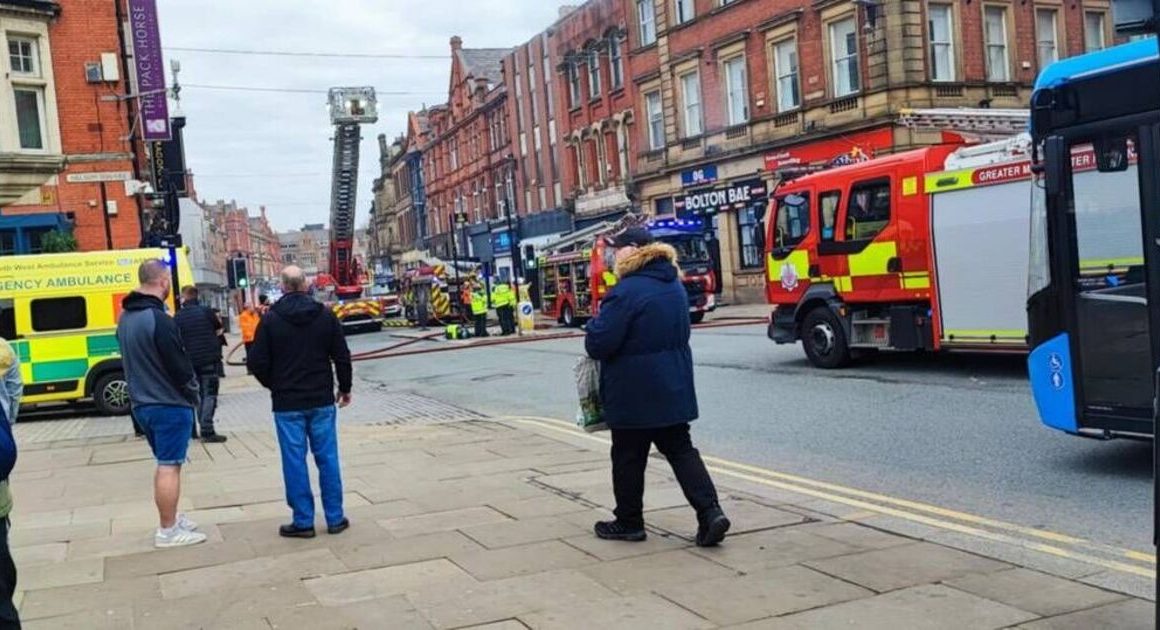
Two workers were killed by a passenger train after a set of tracks in south Wales were left open while they carried out ‘unnecessary’ maintenance (Image: PA)
Network Rail has been slapped with a hefty £3.75m fine over safety breaches that led to the tragic deaths of two workers. The victims, 64-year-old Gareth Delbridge and Michael “Spike” Lewis, 58, were fatally struck by a Swansea to London passenger train while performing maintenance on the tracks in July 2019.
Their colleague, Darren Wilkins, narrowly escaped the same fate. Swansea Crown Court heard the heartbreaking detail that the railway work being carried out at the time was actually unnecessary as the track had already been upgraded, but this information had not been communicated.
Network Rail Infrastructure Ltd had previously pleaded guilty to failing to ensure the safety of employees on the track near Port Talbot. David Travers KC, representing the Office of Rail and Road, revealed that on the morning of July 3, 2019, the men were sent to work at Margam East Coil and Coal and Margam Diesel, east of Port Talbot, with Mr Delbridge acting as team leader due to the absence of the designated leaders.
The court was informed that on the day in question, no track closure – known as a “line block” – was implemented, allowing trains to continue running. It was also revealed that train warning technology was not available on lines in Wales at the time, leading to the use of manual lookouts on open tracks.

Gareth Delbridge (left) and Michael ‘Spike’ Lewis were hit by a passenger train in 2019 (Image: Family photographs)
However, there was no lookout on the curved section of track where the three men were working, reports Wales Online. The court heard that the noisy machinery being used by the workers made it impossible for them to hear the approaching passenger train.
The prosecution argued that Network Rail was guilty of “serious and systemic” failures in implementing and monitoring safe working practices for track workers. It was stated that training on new procedures was conducted by unqualified individuals who lacked a proper understanding of track work.
It was further argued that Safe Work Plans were often created on the same day jobs were being carried out, authorisation was “essentially a tick-box exercise”, and shortcuts were frequently taken. The barrister added that the systems for monitoring compliance were “simply not fit for purpose”.
He claimed that Network Rail was aware of these issues but displayed a “catastrophic lack of urgency in implementing track safety”.
Mr Travers highlighted the tragic irony that the work Mr Delbridge, Mr Lewis, and Mr Wilkins were carrying out at Margam Coil and Coal was “unnecessary” maintenance that “did not need doing at all”. Heart-wrenching victim impact statements were delivered in court by the prosecution barrister from the families of Mr Delbridge and Mr Lewis.
Carol Delbridge, speaking on behalf of her family, said their lives had been “shattered” by her husband’s death, describing Gareth as a cherished father, grandfather, and great-grandfather whose absence has left an “irreplaceable void”. She lamented that the retirement they had envisioned together now appeared to be “a daunting and lonely prospect”.

Two workers were carrying out ‘unnecessary’ maintenance when they were hit (Image: Getty)
The family of Mr Lewis described him as the steadfast “rock” of their family, always ready to go “above and beyond” for his loved ones. They conveyed their devastation over the loss of their “rock” and called for justice regarding the “terrible accident” that claimed the life of their beloved, stating poignantly: “No one should go to work and never come home to their family at the end of the working day.”
Prashant Popart KC, for Network Rail, described the events of July 3 as an “horrific, tragic and preventable incident” in which two employees “needlessly lost their lives and the life of another was put at serious risk”. He said the company accepted responsibility for what happened in Margam and “the main purpose of me standing here today is to speak on behalf of the company and all the people who make up the company in saying sorry – sorry is a woefully inadequate word when two people have died but it is an important word”.
He said there had been significant improvements in track worker safety over the years and the UK now had one of the best records in that respect, and he said it was “simply wrong” to assert that there was no urgency in Network Rail tackling the issue and “there is simply no question of cost savings being prioritised over safety”.
He said Network Rail accepted its failings were a cause of the deaths of the two men and said while not seeking to cast blame it was a fact that Network Rail did not know why the work was being done in the morning when a block on the line had been agreed for the afternoon, and did not know why the work was being done without a lookout. He added: “What this case is really about is that systems were in place but they were not sufficiently adhered to” and Network Rail failed to make sure they were.
Recorder Christian Jowett said he was satisfied that the Network Rail safety standards in place did not adequately address the known issues in track working safety, and said its rollout to staff was “ineffective”. He said Network Rail “knew or should have known about” issues with the rollout of the safety standards and procedures. The recorder said a system of “workarounds” developed which staff thought complied with the safety standards, and that such workarounds were being used on the day of the incident.
With a one-third discount for its guilty plea Network Rail was fined £3,750,000 and was given 42 days to pay. It will also have to pay a £175,000 contribution towards costs. The recorder offered his condolences to the families of the victims and said the court understood that no sentence it could impose could ease their grief or compensate for the loss of their loved ones.
Speaking after the sentencing Nick Millington, route director for Network Rail Wales & Borders, said: “We know that the tragic deaths of our colleagues, Gareth Delbridge and Michael ‘Spike’ Lewis, should never have happened on our railway and that has been reflected by today’s judgment. Over the last five years I have met regularly with Gareth and Spike’s families and our thoughts remain with them, and all those friends and colleagues who have been impacted by their deaths.
“Since this tragedy, we have continued to transform the safety of our workforce through the development of new technology and planning tools, which have almost entirely eliminated the need to work on the railway when trains are running. Today’s judgment reinforces why safety must always be our first consideration, and we will continue to do all we can to make our railways the safest they can be.”
Richard Hines, HM Chief Inspector of Railways, said: “Our thoughts continue to be with the family, friends and colleagues of Michael Lewis and Gareth Delbridge. I am deeply sorry for their loss. The court has imposed a fine of £3.75m which reflects the nature and gravity of Network Rail’s failings.”











